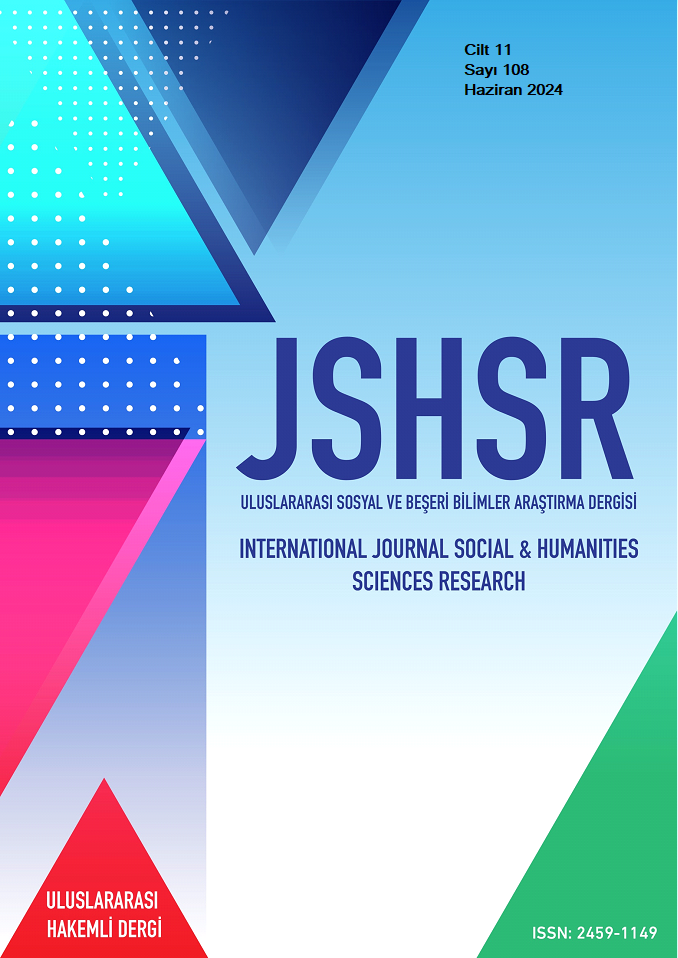The Moderating Role of Self-Compassion in the Relationship Between Turkish Ruminative Thought Style and Eating Attitudes
DOI:
https://doi.org/10.5281/zenodo.12603413Keywords:
Ruminative Thinking Style, Eating Attitude, Self-CompassionAbstract
This study examines the effect of ruminative thinking on eating attitudes and the moderating role of self-compassion in this relationship. Within the scope of the research, data from 400 female participants were collected using three main scales and demographic information forms. According to the results, ruminative thinking has a significant effect on eating attitude. Additionally, it has been determined that self-compassion plays a moderating role in the relationship between ruminative thoughts and eating attitudes. In individuals with high self-compassion, the effect of ruminative thinking on eating attitude is greater than in individuals with low self-compassion. These findings emphasize the importance of self-compassion in the relationship between ruminative thoughts and eating attitudes and suggest that self-compassion development strategies can be used to improve the psychological health of individuals. Limitations of the study include that the participants were only female and that it used a cross-sectional design. Therefore, the generalizability of the results and the determination of causal relationships are limited. It is recommended that these relationships be examined in more detail in future studies using longitudinal designs with larger and more diverse sample groups.
References
Akın, Ü., Akın, A., & Abacı, R. (2007). Öz-duyarlık Ölçeği: Geçerlik ve güvenirlik çalışması. Hacettepe Üniversitesi Eğitim Fakültesi Dergisi, 33(33), 1-10.
Albertson, E. R., Neff, K. D., & Dill-Shackleford, K. E. (2015). Self-compassion and body dissatisfaction in women: A randomized controlled trial of a brief meditation intervention. Mindfulness, 6, 444-454.
Alloy, L. B. (2009). A roadmap to rumination: A review of the definition, assessment, and conceptualization of this multifaceted construct. Clinical Psychology Review, 29(2), 116-128.
Arcelus, J., Mitchell, A. J., Wales, J., ve Nielsen, S. (2011). Mortality rates in patients with anorexia nervosa and other eating disorders. A meta-analysis of 36 studies. Archives of General Psychiatry, 68(7), 724-731. https://doi.org/10.1001/archgenpsychiatry.2011.74
Brinker JK, Dozois JA. Ruminative Thought Style and Depressed Mood. Journal of Clinical Psychology. 2009: 65(1);1-19.
Brown, K. W. Ryan, R. M. (2003). The Benefits of Being Present: Mindfulness and Its Role in Psychological Well-Being. Journal of Personality and Social Psychology, 84.4 822-848.
Costarelli, V., Demerzi, M., & Stamou, D. (2009). Disordered eating attitudes in relation to body image and emotional intelligence in young women. Journal of human nutrition and dietetics, 22(3), 239-245.
Fredrick, J. W., Nagle, K., Langberg, J. M., Dvorsky, M. R., Breaux, R., & Becker, S. P. (2024). Rumination as a mechanism of the longitudinal association between COVID-19-related stress and internalizing symptoms in adolescents. Child Psychiatry & Human Development, 55(2), 531-540.
Josefsson, A., Hreinsson, J. P., Simrén, M., Tack, J., Bangdiwala, S. I., Sperber, A. D., ... & Törnblom, H. (2022). Global prevalence and impact of rumination syndrome. Gastroenterology, 162(3), 731-742.
Klein, H. J., Wesson, M. J., Hollenbeck, J. R., ve Alge, B. J. (1999). Goal commitment and the goal-setting process: Conceptual clarification and empirical synthesis. Journal of Applied Psychology, 84(6), 885-896. https://doi.org/10.1037/0021-9010.84.6.885
Le Grange, D., ve Eisler, I. (2009). Family interventions in adolescent anorexia nervosa. Child and Adolescent Psychiatric Clinics of North America, 18(1), 159-173.
Martell, C. R., Addis, M. E., & Jacobson, N. S. (2001). Depression in context: Strategies for guided action. WW Norton & Co.
Morrow, J., ve Nolen-Hoeksema, S. (1990). Effects of responses to depression on the remediation of depressive affect. Journal of Personality and Social Psychology, 58(3), 519-527
Neff, K. D. (2003a). Development and validation of a scale to measure self-compassion. Self and Identity, 2(3), 223-250.
Neff, K. D. (2003b). Self-compassion: An alternative conceptualization of a healthy attitude toward oneself. Self and Identity, 2(2), 85-101.
Neff, K. D., ve Germer, C. K. (2013). A pilot study and randomized controlled trial of the mindful self-compassion program. Journal of Clinical Psychology, 69(1), 28-44.
Neff, K. D., ve Vonk, R. (2009). Self-compassion versus global self-esteem: Two different ways of relating to oneself. Journal of Personality, 77(1), 23-50.
Nolen-Hoeksema, S. (2000). The role of rumination in depressive disorders and mixed anxiety/depressive symptoms. Journal of Abnormal Psychology, 109(3), 504-511.
Opwis, M., Schmidt, J., Martin, A., & Salewski, C. (2017). Gender differences in eating behavior and eating pathology: The mediating role of rumination. Appetite, 110, 103-107.
Raes, F. (2011). The effect of self-compassion on the development of depression symptoms in a non-clinical sample. Mindfulness, 2(1), 33-36.
Smith, J. M., & Alloy, L. B. (2009). A roadmap to rumination: A review of the definition, assessment, and conceptualization of this multifaceted construct. Clinical Psychology Review, 29(2), 116-128.
Şahin, E. E. (2020). Üniversite öğrencilerinde bağlanma ve sosyal bağlılık arasındaki ilişkide yetersizlik duygusu ve mükemmeliyetçiliğin aracı rolü (Doktora tezi), Anadolu Universitesi.
Tabachnick, B. G., Fidell, L. S., & Ullman, J. B. (2013). Using multivariate statistics Boston, MA: pearson.
Treasure, J., Claudino, A. M., ve Zucker, N. (2010). Eating disorders. The Lancet, 375(9714), 583-593.
Treynor, W., Gonzalez, R., ve Nolen-Hoeksema, S. (2003). Rumination reconsidered: A psychometric analysis. Cognitive Therapy and Research, 27(3), 247-259.
Watkins, E. (2008). Constructive and unconstructive repetitive thought. Psychological Bulletin, 134(2), 163-206. https://doi.org/10.1037/0033-2909.134.2.163
Downloads
Published
How to Cite
Issue
Section
License
Copyright (c) 2024 INTERNATIONAL JOURNAL OF SOCIAL HUMANITIES SCIENCES RESEARCH

This work is licensed under a Creative Commons Attribution 4.0 International License.


